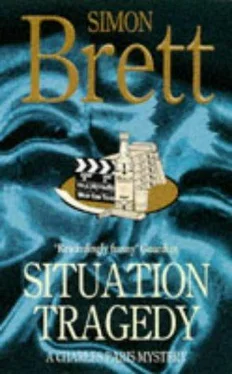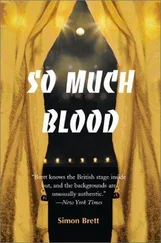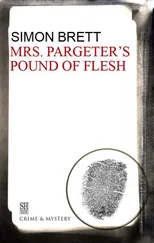Simon Brett - Situation Tragedy
Здесь есть возможность читать онлайн «Simon Brett - Situation Tragedy» весь текст электронной книги совершенно бесплатно (целиком полную версию без сокращений). В некоторых случаях можно слушать аудио, скачать через торрент в формате fb2 и присутствует краткое содержание. Жанр: Классический детектив, на английском языке. Описание произведения, (предисловие) а так же отзывы посетителей доступны на портале библиотеки ЛибКат.
- Название:Situation Tragedy
- Автор:
- Жанр:
- Год:неизвестен
- ISBN:нет данных
- Рейтинг книги:3 / 5. Голосов: 1
-
Избранное:Добавить в избранное
- Отзывы:
-
Ваша оценка:
- 60
- 1
- 2
- 3
- 4
- 5
Situation Tragedy: краткое содержание, описание и аннотация
Предлагаем к чтению аннотацию, описание, краткое содержание или предисловие (зависит от того, что написал сам автор книги «Situation Tragedy»). Если вы не нашли необходимую информацию о книге — напишите в комментариях, мы постараемся отыскать её.
Situation Tragedy — читать онлайн бесплатно полную книгу (весь текст) целиком
Ниже представлен текст книги, разбитый по страницам. Система сохранения места последней прочитанной страницы, позволяет с удобством читать онлайн бесплатно книгу «Situation Tragedy», без необходимости каждый раз заново искать на чём Вы остановились. Поставьте закладку, и сможете в любой момент перейти на страницу, на которой закончили чтение.
Интервал:
Закладка:
What was remarkable about it was that they looked so familiar. The photograph was only a half-page and the whole of the Bentley was in shot, so it was difficult to see much detail of their faces. Aurelia wore one of her floating gowns, and a hat tied on with a scarf. Barton wore a blazer and cravat, and his hair was obscured by a large white flat cap. The car, which must have been a lot newer when the photograph was taken, was identical to the one they now drove around in.
In fact, to the casual eye, the photograph could have been taken a few weeks before, when the couple drove away from Bernard Walton’s house after the day’s filming.
‘Do you know anything about this film?’ Charles asked.
Romney Kirkstall shook his head. ‘Never heard of it. But then I’ve always concentrated on Dab’s theatrical work. That is, until she stopped doing theatre and started television.’
Charles looked again at the photograph, but was aware of Romney Kirkstall’s hands reaching out for the book. ‘If you don’t mind. .’
There was a note of paranoia in the little man’s voice, as if he were genuinely afraid Charles was going to appropriate his prize.
‘Okay, thank you very much for letting me look at it.’ He handed the book back and, without another word, Romney Kirkstall stuffed it into his duffle bag and scuttled off.
Jay Lewis was chattering to some other young PAs. She turned round angrily when he ran a finger down her spine, but softened when she saw who it was. Which was nice.
‘Hello, Charles.’
‘Hi. I wondered if you fancied coming out for a meal.’
‘Now?’
‘Uh-huh.’
‘I’ve just fixed to go and eat with Dinky and Lucretia.’ She indicated the other girls. ‘You could come with us, I suppose.’
‘Not really what I had in mind.’
She grinned a grin that suggested she knew what he did have in mind. And didn’t object too much.
‘Another time, maybe,’ he proposed.
‘Hock — A.’
‘And do you think your flatmate in Film Research could find out something for me?’
‘I’m sure she could.’
‘Good. I’ll tell you about it when we have our meal.’
He got another drink (had to buy his own — Peter Lipscombe had left) and looked round for someone to talk to. Most of the cast had gone. Jay and her friends were collecting their coats by the door. Knots of cameramen still drank lager. Men in lumberjack checked shirts grumbled ominously. Robin Laughton, the hearty Floor Manager, held court to some young men at a low table. Charles drifted over to join them.
Robin seemed pleased to see him. He was showing off his savoir-faire to a group of trainee Floor Managers, and wanted to demonstrate his easy familiarity with the stars. Since there weren’t any stars in the bar, he would make do with Charles Paris.
‘Charles, just passing on a few wrinkles to the lads here. Charles Paris, this is Bob, and Tony and. . er. . ’
‘Dick,’ supplied the youngest young man, who looked vaguely familiar. ‘Actually. Charles, we met on The Strutters’ pilot. I was trailing Robin on that.’
‘Ah yes.’ That would explain the familiarity. ‘What’ve you been doing since?’
‘Oh, trailing other stuff. I went and did some of the Wragg and Bowen filming, and then I’ve been following this series for the elderly. Do you know they’ve got this presenter on that called Ian Reynolds, who’s nearly eighty?’
‘Yes. I had heard.’
‘He’s a great old boy. He’s not got a nerve in his body when it comes to-’,
Robin Laughton decided that the trainee had held the floor long enough and interrupted. ‘I must tell Charles about you and the walkie-talkie.’
‘Oh.’ Dick did not look keen on having the anecdote repeated.
But Robin Laughton pressed on with enthusiasm. Clearly it was a story that was going to show up Dick’s inexperience. ‘Charles, you know we all carry round these walkie-talkies, so that we can talk back to production control?’
‘Yes.’
‘Well, one thing you’ve got to remember is to switch them off, otherwise you’re wired for sound at all times. .’
‘Yes.’
The other two trainee Floor Managers snickered in anticipation of the story they had heard before, and Dick looked even more uncomfortable, but Robin continued inexorably. ‘Well, when Dick was very new, two or three months back, he was all wired up and he forgot about it and went off to the Gents to have a shit.’
This was the cue for the other trainees to burst into open laughter, which they dutifully did.
‘Everyone,’ Robin Laughton continued, ‘heard everything. You got a round of applause when you came back into the studio, didn’t you, Dick?’
‘Yes.’ He grinned and, reckoning that his baiting was now finished, tried to change the subject. ‘What interests me, Charles, about — ’
But Robin Laughton wasn’t going to let him off the hook that easily. ‘Oh. Dick kept doing things like that when he started. After the lavatory incident. he went and lost his set one day.’
‘Well, I mislaid it.’ Dick was not enjoying this crude masculine teasing. ‘I just put it down somewhere. There’s a lot to think about when you start.’
‘Oh yes, a great deal,’ Robin Laughton mocked. Charles saw the Floor Manager for what he was, the sort of man who would offer no sympathetic assistance to trainees in his charge, but would take delight in watching them make mistakes. Having started niggling at Dick, he couldn’t leave the subject alone. ‘Actually, it was on The Strutters’ pilot you lost it, wasn’t it? Lost it for the bloody Dress Run. My, you were a useful Floor Manager, weren’t you?’
The other trainees laughed obediently. Dick spoke angrily. ‘Look, I found it straight after. Right at the beginning of Line-up.’
Robin Laughton continued his mockery. ‘He’d left it switched on, needless to say. Relaying anything it picked up into Production Control. Lucky the batteries weren’t completely flat.’
‘Where had you left it?’ asked Charles, suddenly interested.
‘In the Quick Change Room.’
‘And you found it just after six?’
‘Yes.’
‘And was there anyone in the Quick Change Room?’
Dick was relieved at the change of interrogator and replied readily. ‘Yes. Sadie Wainwright was in there, being her usual bad-tempered self.’
‘Bad-tempered to you or to someone else?’
‘Both. She appeared to be in the middle of an argument when I went in. and then bit my head off.’
‘Who was in there with her?’
‘Aurelia Howarth.’
CHAPTER NINE
Rod Tisdale’s final message to the world, the sixth (or, if you count the pilot, seventh) episode of The Strutters was on a theme he had used before. In What’ll the Neighbours Say? much of the comedy had derived from the conflict between the wildly bohemian (if slightly overmature) Bernard Walton character and his more conventional neighbours, the Strutters. In The Strutters, the reactionary disapproval of the Colonel and his wife was moved to the centre of the action, and directed at everything in general and at their son in particular. This character, played by Nick Coxhill, became increasingly indistinguishable from the Bernard Walton character in What’ll the Neighbours Say? He it was now who turned up in episodes with black girlfriends or wearing kaftans (sit cams must be the only places in the world where kaftans are still worn as a symbol of Bohemianism) or playing music too loud. (In the original script for this last plot, Rod Tisdale had gone daringly modern and had the character smoking pot, but West End Television, feeling this was a bit strong, had changed it to playing music too loud, which, as they said, ‘made the same point’.)
Читать дальшеИнтервал:
Закладка:
Похожие книги на «Situation Tragedy»
Представляем Вашему вниманию похожие книги на «Situation Tragedy» списком для выбора. Мы отобрали схожую по названию и смыслу литературу в надежде предоставить читателям больше вариантов отыскать новые, интересные, ещё непрочитанные произведения.
Обсуждение, отзывы о книге «Situation Tragedy» и просто собственные мнения читателей. Оставьте ваши комментарии, напишите, что Вы думаете о произведении, его смысле или главных героях. Укажите что конкретно понравилось, а что нет, и почему Вы так считаете.












